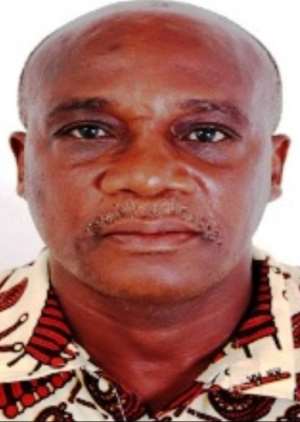
Atitso Charles Akpalu isn’t your average retired civil servant. With over four decades of dedicated service—including pivotal roles at Ghana’s Ministry of Trade, Industries & Tourism and the U.S. Embassy’s Information Resource Centre—he has redefined the concept of retirement, emerging as one of Ghana’s most solution-driven civic voices.
From crafting thought-provoking essays to pioneering regional innovation, Akpalu fuses intellect with infrastructure. And behind this legacy are seeds planted by early mentors who believed in him, challenged him, and stretched his potential across boundaries—names like Daniel Magaffi, Nick Robertson, Brooks Robinson, and Bruce Lohof, each of whom played an indispensable role in shaping the conscience behind the commentary.
The Mentor’s Mandate: Foundations That Shaped a Statesman
Akpalu’s entry into the U.S. Information Service wasn’t just a job—it was a crucible. His first assignment, delivered with civil service precision, was swiftly met with a closed-door encounter that he never forgot. Daniel Magaffi, who had personally interviewed and employed him, didn’t mince words:
“I hired you to work for me. I expect you to take responsibility—or you’re fired.”
It wasn’t a rebuke—it was a release. That exchange dismantled the hierarchical conditioning of bureaucracy and instilled in him the boldness to own his decisions, speak his truth, and constructively challenge norms.
Nick Robertson would later affirm that voice, encouraging spirited strategic dialogue. Brooks Robinson sharpened his precision, instilling the importance of historical context. Bruce Lohof modeled diplomatic integrity and cross-cultural empathy that would echo throughout Akpalu’s civic writing and regional projects.
Their mentorship lives on in the clarity of his prose and the impact of his innovations.
The Pen as Blueprint for Reform
Akpalu’s public writing is less commentary, more civic architecture. Each article is a carefully structured intervention that challenges broken systems and proposes tangible alternatives.
Among his widely read essays:
A forensic exposé of executive transfers that triggered parliamentary petitions and media scrutiny.
A bold redesign of Ghana’s digital identity system, grounded in citizen-first principles.
A compelling call for pharmaceutical self-sufficiency, anchored in herbal innovation and local research.
An uncompromising critique of “spousal corruption”, demanding that Parliament uphold boundaries between elected power and unelected influence.
These aren’t idle musings—they are policy blueprints designed to redirect national discourse.
From Writing to Building: A Healthcare Revolution in Motion
Akpalu is not merely a diagnostician of dysfunction—he’s a builder of alternatives. In a groundbreaking collaboration with Indian partners, he is spearheading the rollout of mobile medical telemedicine labs across West Africa—compact, AI-enabled diagnostic units targeting rural and underserved communities.
Key features:
Portable or modular units fitted with ultrasound, ECG, digital X-ray, and lab testing equipment.
AI-assisted diagnostics with remote links to specialist doctors.
GSM and satellite connectivity for real-time rural access.
Why it matters:
Early detection of diseases like cervical cancer, diabetes, and malaria.
Reduced travel burden on rural patients.
Skills training for local health workers.
Scalable response model for regional health emergencies.
Improved access to quality care across all 6,000+ CHPS compounds in Ghana, extending vital services to every district—including hard-to-reach riverine and island communities around the Volta Lake.
1. This goes beyond healthcare—it’s a commitment to fairness, dignity, and leaving no community behind. Not just innovation, but a living example of equity in action.
2. More than a healthcare solution—it’s a bridge to equality and empowerment for every corner of the country. This isn’t just innovation—it’s justice delivered.
3. It transcends medicine—it’s about reaching the unreached, uplifting the underserved. It’s not just a technological step forward—it’s equity, realized.
Accolades from the Ground
“Akpalu doesn’t just write to point fingers—he writes to point forward. His articles sharpen our civic lens.”
Health Equity Coalition, Accra
“The mobile lab project represents the best of South-South collaboration—scalable, smart, and sovereignty-minded.”
ECOWAS Regional Health Planning Officer*
One Voice, Many Ripples
Akpalu’s vision aligns with some of the continent’s boldest aspirations:
Ghana’s Universal Health Coverage agenda, especially around diagnostics and access equity.
ECOWAS policy objectives for mobile health solutions, pooled procurement, and tech-enabled care.
Civil society movements demanding transparency, local innovation, and accountable governance.
But Akpalu’s genius lies not only in what he builds—but in what he believes: that principled writing, backed by informed action, can shift nations.
The Man Behind the Mission
Akpalu didn’t study journalism—he stepped into it as a civic duty. His essays are not memoirs; they are mandates. He leverages public records, lived experience, and historical memory to craft powerful reform narratives that resonate from Parliament halls to village squares.
And at every turn—whether sharpening a critique or assembling a lab—his mentors’ voices echo back. They taught him to think boldly, speak clearly, and own the outcomes.
He hasn’t just retired—he’s retooled. In a region yearning for direction, Akpalu stands tall: writing, building, and still pointing forward.
Written by: Dawn Vision
Published by: Atitso Akpalu


